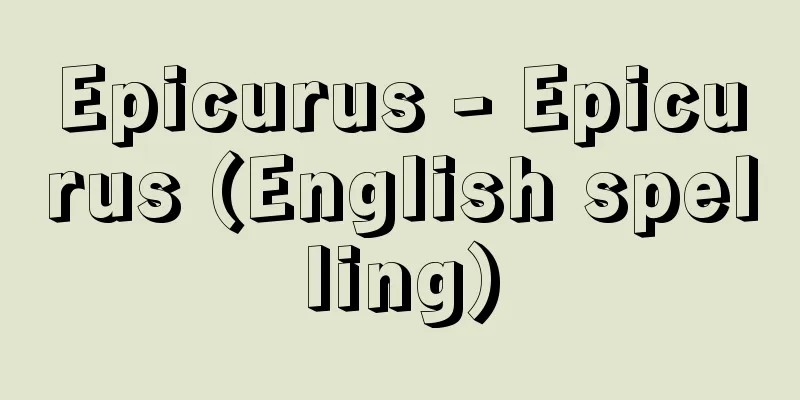Epicurus - Epicurus (English spelling)

|
Ancient Greek philosopher. Born on the island of Samos. At about the age of 35, he opened a school in Athens. The school was called the "Garden of Epicurus" and was open to women and slaves. All of his major works have been lost, leaving only his "Epicurus" and three letters. At a young age, he studied Democritus' atomic theory and its ethical ideas, which formed the basic framework of his thought. Epicurus tried to liberate humans from the confusion caused by desires and passions, the fear of death, and the superstition of punishment by the gods. The purpose of philosophy is to obtain ataraksia (peace of mind) through this liberation, and its foundation is physical science. That is, there are two true entities: atma (atom) and kenon (void), the former being the ultimate indestructible entity, and the latter the place where atoms move. The fundamental movement of atoms is the downward falling movement from top to bottom, during which the atoms undergo parenkrisis (indefinite wandering), which causes collisions between atoms and the world is generated. Therefore, everything in the world, including objects, gods, and the human soul, is nothing but a combination of atoms. Naturally, cognition is nothing but the contact between the atoms radiating from objects and the atoms that make up our souls. Therefore, death is the dissolution and dispersion of the atomic combinations that make up a human being, including the soul, and therefore all knowledge disappears at the same time as death. The gods are of the same nature as humans and have no interest in them. A life of pleasure is a life of peace, which is achieved by being free from excessive desires and passions, by avoiding public life and living in seclusion, by being content with a life of bread and water, and by respecting friendship. [Yasuo Iwata] [References] | |Source: Shogakukan Encyclopedia Nipponica About Encyclopedia Nipponica Information | Legend |
|
古代ギリシアの哲学者。サモス島に生まれる。35歳ごろアテネに学園を開く。その学園は「エピクロスの園」とよばれ、婦女子や奴隷にも門戸を開放した。主著はすべて散逸、わずかに『主要教説』と3通の手紙を残すのみ。若くしてデモクリトスの原子論とその倫理思想を学び、これが彼の思想の基本的骨格を形成する。 エピクロスは、欲望や激情から生ずる惑乱、死の不安、神々の処罰という迷信から人間を解放しようとする。哲学の目的は、この解放によってアタラクシアー(心の平安)を得ることにあり、その基礎をなすものが自然学である。すなわち、真の実在はアトマ(原子)とケノン(空虚)の二つで、前者は不壊(ふえ)の究極的実体、後者は原子が運動する場所である。原子の根源的運動は上から下への落下運動であるが、この際原子にパレンクリシス(不定の彷徨(ほうこう))がおこり、これによって原子相互間の衝突が生起し、世界が生成する。それゆえ、世界にあるすべてのものは、物体も神々も人間の霊魂も、原子の結合物にすぎない。当然、認識も物体の放射する原子とわれわれの魂を構成する原子との接触にほかならない。 したがって、死とは魂をも含めて人間を構成する原子結合体の分解散逸であるから、死と同時にあらゆる認識が消滅する。神々は人間と同質の存在で、人間に関心をもたない。快楽の生とは平安の生であり、これは、過度の欲望や激情から解放されること、公共生活を避け隠れて生きること、パンと水の生活に満足すること、そして友情を尊重することにより、実現されるものであった。 [岩田靖夫] [参照項目] | |出典 小学館 日本大百科全書(ニッポニカ)日本大百科全書(ニッポニカ)について 情報 | 凡例 |
Recommend
Gardenia - Gardenia
An evergreen shrub of the Rubiaceae family. It is ...
Defective Possession - Defective Possession
…The state and public organizations are held liab...
casting defect
...The solidification process is simulated using ...
authentic movement
…This theme was dramatically played out in the yo...
Winter chrysanthemum - kanchuku
According to statistics from the Ministry of Agri...
Noshi - Gift wrapping
Abbreviation of Noshi Awabi. Abalone meat is peel...
Ney, Michel
Born: January 10, 1769, Saarlouis [Died] December ...
Fool's Letter
...A collection of satirical letters in Latin. So...
Native capital
Indigenous capital in colonies and dependent coun...
Ritual - Kirei
Ritual rituals are behaviors that are standardized...
Response move - King move
…There are five basic movements: stance, footwork...
Integrable - Integrable
...When f is unbounded, we define f n ( x ) = min...
Frequency -
Chinese novelist. His real name was Zhou Shaoyi. ...
Ley Lerdo (English spelling)
The Law on the Dissolution of Perpetual Property ...
Guarini, GB - Guarini
...Typical poets include Tasso in Italy, Ronsard ...









